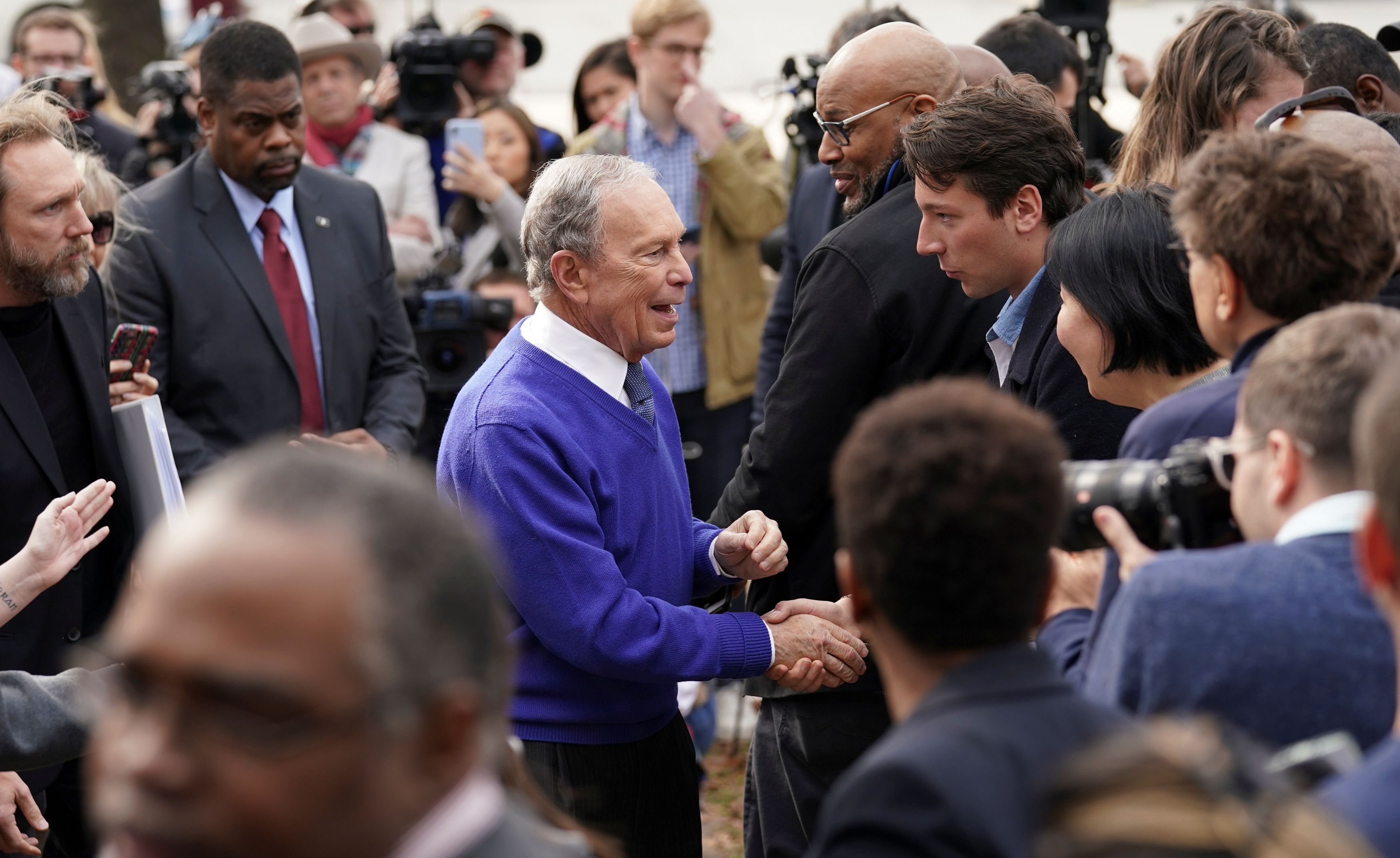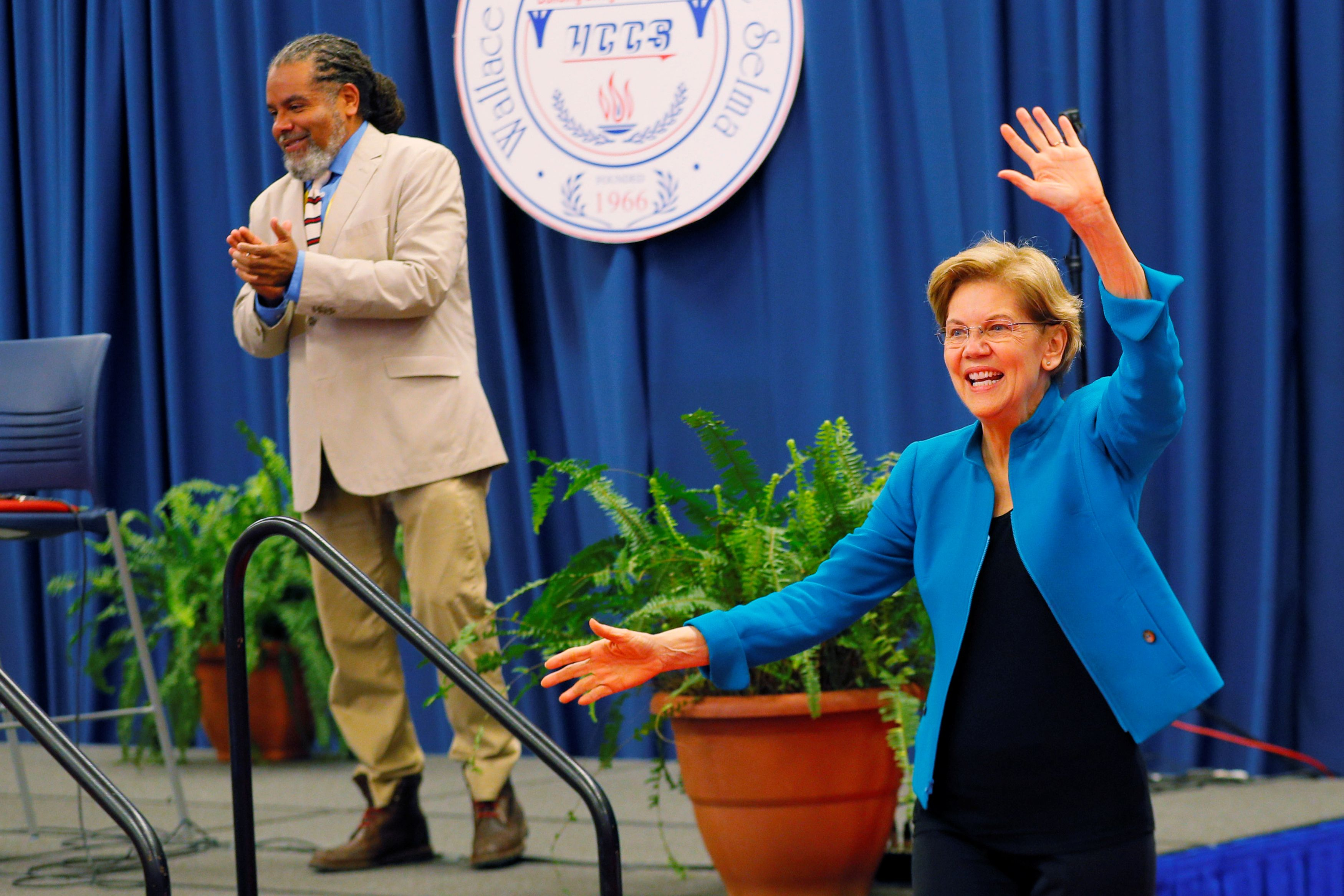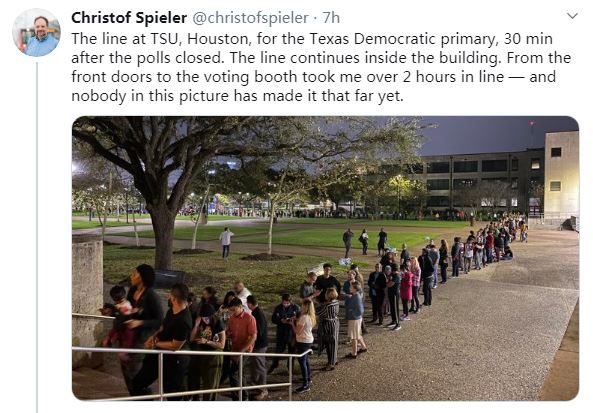
A voter enters a voting booth in New Hampshire's presidential primary election in Stark, New Hampshire, U.S., February 11, 2020. /Reuters
A voter enters a voting booth in New Hampshire's presidential primary election in Stark, New Hampshire, U.S., February 11, 2020. /Reuters
Five candidates, 14 states and 1,357 delegates up for grabs: Super Tuesday's Democratic primaries offered plenty of surprises and upsets.
Here are some key takeaways from the races.
1. Money doesn't buy an election
Billionaire and former New York City Mayor Michael Bloomberg forked out millions on campaign ads after entering the Democratic race in November, drawing accusations that he was trying to buy his party's nomination.
But it appeared to have been largely a waste.
Ahead of Super Tuesday, Bloomberg spent half a billion U.S. dollars on TV, radio, print and digital ads, Reuters reported, citing data from Advertising Analytics.
This included 217 million U.S. dollars in the 14 states voting on Tuesday, far ahead of the next biggest spender, Vermont Senator Bernie Sanders, with 16 million U.S. dollars.
The massive spending spree helped propel Bloomberg to the front of the Democratic field after he had entered it late, but in his first primary contests on Tuesday – he had skipped the others until now – his results proved paltry.
His only win was in American Samoa, a U.S. territory that gets to help pick the candidates but cannot vote in the presidential election. Elsewhere, he came in third place at best, far behind the frontrunners.

U.S. Democratic presidential candidate Michael Bloomberg greets volunteers during a canvass kick-off as he campaigns in Manassas, Virginia, U.S., March 2, 2020. /Reuters
U.S. Democratic presidential candidate Michael Bloomberg greets volunteers during a canvass kick-off as he campaigns in Manassas, Virginia, U.S., March 2, 2020. /Reuters
Most disappointing was the former mayor's result in North Carolina, where he trailed former Vice President Joe Biden and Sanders with just 13 percent of votes, despite forking out 12.8 million U.S. dollars in ads in the state, according to Politico.
It was "not a very good return on his investment," former White House official and CNN commentator David Axelrod noted.
Another billionaire, Tom Steyer, already dropped out of the race over the weekend after copious spending in South Carolina failed to secure him more than a third place finish in that state's primary.
2. The electability issue
The last viable female candidate in the race, Massachusetts Senator Elizabeth Warren, consistently impressed voters and pundits throughout her campaign with strong debate performances and clear policy plans.
But this has not translated into voter support in the Democratic primaries, and on Super Tuesday she failed to win a single contest, even her home state of Massachusetts, raising doubts over whether Americans are ready to elect a female president.
Seven months ago, half a dozen women were in the running for the party's nomination. This came after a wave of female politicians swept into the House of Representatives and governorships in 2018.
In October, a national poll even put Warren in the lead among Democratic candidates.

Democratic presidential candidate Elizabeth Warren arrives to speak at the Presidential Candidate Forum in Selma, Alabama, U.S., March 1, 2020. /Reuters
Democratic presidential candidate Elizabeth Warren arrives to speak at the Presidential Candidate Forum in Selma, Alabama, U.S., March 1, 2020. /Reuters
But the specter of Hillary Clinton losing to Donald Trump in the 2016 presidential election continues to haunt voters, both male and female, as they pick the person who will face him in November.
Voters have repeatedly said they like Warren and want to support her, but they are concerned about her "electability."
This may be a self-fulfilling prophecy: in an Ipsos survey last year, 74 percent of people said they would be comfortable with a female president, but only 33 percent thought their neighbors would be too. Many may be hedging their bets, voting instead for a candidate they see as more likely of winning.
3. Last-minute decisions
A large number of voters who made up their mind at the last minute helped tip the balance in favor of Biden on Tuesday, according to exit polls.
Three in 10 voters only decided whom they would support in the last few days, and of those 49 percent swung behind the former vice president, NBC News reported.
This coincided with Biden winning the South Carolina primary on Saturday, as well as Steyer, Minnesota Senator Amy Klobuchar and former South Bend Mayor Pete Buttigieg dropping out of the race amid calls for the party to unite behind a single candidate.
Among voters who had made their choice much earlier, Sanders had been the preferred candidate.

4. Early voting and drop-outs
Some voters in key states on Super Tuesday meanwhile faced the frustrating reality that their vote had counted for nothing.
In Colorado, Utah and all-important Texas and California, about half of voters were estimated to have voted by early or absentee ballot. But for those who picked Klobuchar, Buttigieg or Steyer, that vote went out the window when their candidate pulled out of the race.
Whether this tips the scales in favor of one or the other remaining candidates is unclear.
In Florida, people who voted early for one of the candidates who has since quit are reportedly asking for a second ballot to be able to vote again in the state's March 17 primary.
5. Get in line
Organizational snafus are a recurring theme during U.S. elections and voters in Texas and California – the two most populous states with huge weight in terms of delegates – had to spend hours queuing before they could cast their ballot on Super Tuesday.
Long lines, continuing after polling stations had officially closed, were reported in Dallas, Houston and on several university campuses in Texas. Polling stations in Los Angeles County and elsewhere in California also struggled to cope with the influx of people, made worse by technical issues with new voting equipment.
In several locations, people queued for three hours or more, late into the night.
Neck and neck with Biden in Texas, Sanders even put out a last-minute appeal to his supporters: "If you're in line to vote, stay in line!"